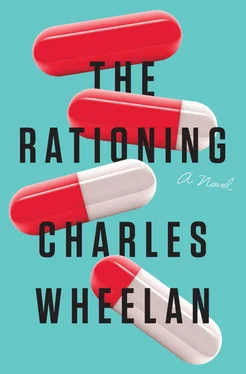The Majority Leader was an unabashed patriot, so much so, he said, that he never felt the need to leave our beloved country. When he was younger, he made one trip with his high school Spanish class to Mexico City. “That was enough,” he told Rotary Clubs and New Republican Party conventions. He said it in a way that made people cheer. Don’t get me wrong: He was no buffoon. You do not get elected to the U.S. Senate three times—not anywhere, not ever—without some prodigious talents. He could talk in an informed but vague way to Chicago business groups about “oppressive taxes and regulations.” He would rattle off some examples of wasteful federal spending that were both telling and humorous, such as the earmark in the farm bill to study the mating habits of potbellied pigs. That always got a chuckle. As the laughter faded away, he would say, “I can tell you how they mate for a lot less than two hundred and fifty thousand dollars!” The audience would roar again.
He was not scary on social issues, so the suburbanites were attracted to him. That was part of the Republican divorce. The New Republicans got the low taxes, pro-business planks in the platform and the Tea Party got the social issues: opposition to gay marriage, abortion, and the like. (They had joint custody of guns.) The settlement was lopsided, at least with someone as politically adroit as the Majority Leader atop the New Republican Party. “Let me see if I can explain the difference between the New Republicans and the Tea Party,” he would tell his audiences. “Our number one New Republican priority is making sure that hardworking people can earn a decent living.” He would pause, making eye contact around the room, big or small. “Sometimes that means a little help from the government.” Another pause, more eye contact. “Sometimes it means keeping the government out of your business.” Pregnant pause. “I believe that honest people deserve to make an honest living, and that we should do whatever we need to do to make that possible.”
There would be enthusiastic nods of approval—not whoops or cheers, but heartfelt agreement. And then he would go in for the kill. “Now, the Tea Party , they are going to work just as hard. I do not doubt their passion or commitment, not for one second. I agree with them on a lot of things. These are good people, many of them, at least.” There would be some chuckles. “The difference is priorities. They are going to spend every waking moment trying to get Washington to tell you what you can and can’t do—in your bedroom, in the hospital, in the bathroom, at school—sometimes even in the bathroom at school.” Lots of laughter. “I’m pro-business, they are all up in your business!” This last line did typically provoke cheers of approval. It was a brilliant strategy, allowing him to transcend the social issues that had previously been a political fault line. He could tell the social conservatives that he shared their beliefs. They were tired of being mocked and disrespected by the liberal establishment. Yet he could also tell libertarians and liberal suburbanites that he was not going to politicize those same social issues.
The Majority Leader eviscerated the Tea Party in Illinois, and later marginalized them nationally when he became Majority Leader and de facto national leader of the New Republicans. After he delivered high-speed rail to the Midwest and found federal funding for a third airport in Chicago, he was untouchable. He and the President had a better relationship than one might expect. True, they did not share a political party, but they both were creatures of Washington. The President envied the Majority Leader’s ability to connect with Main Street, even as he mocked his lack of sophistication. The President frequently referred to him behind his back as “Lyndon,” as in Lyndon Johnson, because of his coarse manners and savvy political machinations. “Tell Lyndon we need to get this out of the Senate without any amendments,” he would say at the end of a staff meeting. The irony, of course, is that the Majority Leader would have considered the LBJ comparison nothing but a compliment.
The relationship was made easier by the fact that the Majority Leader had no designs on the presidency. “I’m too fat and too short,” he would tell people who asked. It was a brilliantly disarming answer, mostly because it hewed so closely to the truth. He had seen the polling data (as had the President and others): most Americans were willing to elect a president without a college degree, but they could not get past his body type. Focus groups would hem and haw when asked to explain why the Majority Leader “did not look presidential.” If the discussion went on long enough, or if the participants were asked to write comments anonymously, they would just come out and say it: “He’s fat,” then adding some tortured reasoning as to why a man who had functioned brilliantly for seven years as the leader of the U.S. Senate would not be able to serve effectively as Commander in Chief because he weighed too much.
Unlike the real Lyndon Johnson, the Majority Leader did not lust for what he could not have. He had a love and appreciation for politics—not just winning elections, but also the legislative give-and-take. He had a long memory but also a thick skin. He never forgot a political defeat, but he was not apt to take the setbacks personally. Instead, every loss, big or little, was a lesson on how to do it better next time. “This isn’t powder puff,” he would tell his audiences, whether it was a Rotary lunch or a group of CEOs. His one intellectual passion was political history and he could recount in detail, more accurate than not, the political failures that had brought great civilizations to their knees.
Others have written in great depth about this unlikely “bromance” between the Majority Leader and the President; there is not much for me to add, other than underscoring that the two of them got along well because they had so little in common. There was no margin on which they viewed themselves in competition with one another. The President called frequently on the Majority Leader to chat informally about the political viability of various ideas. “How can I sell this in the Midwest?” the President would ask earnestly. For his part, the Majority Leader was flattered to be so important to the White House.
The Secretary of Defense was in the room because he had been at the White House for a different meeting and the President asked him to stay for a few minutes. Like I said, no grand strategy—not at the beginning. The Secretary of Defense had spent his career making tough decisions in the face of uncertainty. He and the President had a respectful if somewhat guarded relationship. The President had not served in the armed forces; he recognized that as a weakness and did what he could to remedy it. Still, there was more to the relationship between the two men than that. The Secretary of Defense was a straight shooter who often saw the world differently than the President and did not hesitate to speak candidly to his Commander in Chief. He was loyal, too. The President had come to appreciate the honesty and loyalty in a town where both virtues are oddly rare. “Can you stick around for a few minutes?” the President asked the Secretary of Defense as a meeting on the newly restarted North Korean nuclear program was breaking up. “We’ve got some problem at HHS with our stock of Dormigen.” One has to appreciate the innocence of that moment, because that is really all the President knew: “some problem at HHS”—seemingly just like all the other little fifteen-minute annoyances that made up each of his days at the White House. A treaty here, an angry African leader there.
“I don’t know anything about Dormigen,” the Secretary of Defense replied.
Читать дальше












